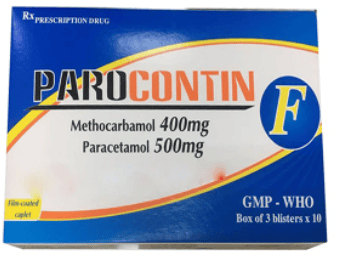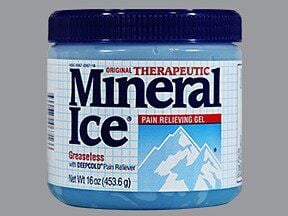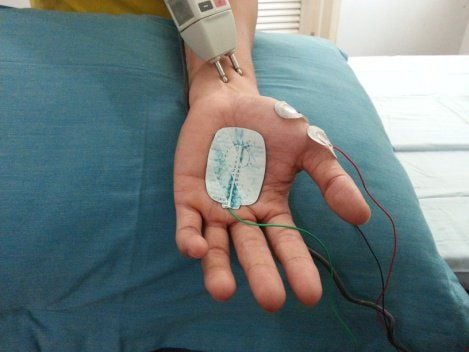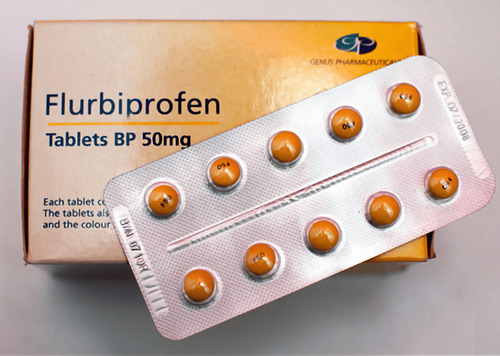This is an automatically translated article.
Amemoin is made in the form of tablets, with the main ingredient being Methocarbamol. The drug is used to relax muscles, relieve pain caused by muscle spasms,... Read the article below to get more useful information about its uses and notes when using this drug.
1. Uses of the drug Amemoin
Amemoin brand-name drug with the main ingredient is Methocarbamol 500mg. Methocarbamol is a muscle relaxant and has a mild sedative effect. This ingredient has a long-lasting muscle relaxant effect on skeletal muscles thanks to a selective inhibitory mechanism on the central nervous system, especially the interneurons. From there, the drug helps to calm the central nervous system, inhibit spasms, relieve central pain, relieve acute pain and muscle spasms.
In the treatment, Methocarbamol gives quick action (after only 30 minutes), high and long-lasting effect, and almost no side effects. Usual doses of Methocarbamol do not impair normal muscle strength or muscle reflexes. At the same time, Methocarbamol also has no effect on motor neurons. In addition, Methocarbamol at non-toxic doses also has effects on the nervous system on the medulla.
Indications for use of Amemoin: Pain relief in cases of pain related to skeletal muscle spasms in any location on the body such as:
Acute and chronic pain due to muscle tension, trauma, myositis , sprain, whiplash syndrome; Pain and muscle spasms associated with arthritis, joint strains and sprains, torticollis, bursitis, or lower back pain have an obvious cause. Amemoin is contraindicated in the following cases:
Allergy, hypersensitivity to Methocarbamol, Paracetamol or other components of the drug; People with liver or kidney disease; Patients with muscle weakness or severe myasthenia gravis; People with a history of brain damage; The patient is comatose or pre-coma.
2. Instructions on how to use Amemoin
Amemoin is taken orally. Patients should take Amemoin tablets whole with cooled boiled or filtered water.
Usual dose of Amemoin: Take 1 tablet - 3 tablets / time x 4 times / day. The recommended starting dose in adults is 2 tablets every 6 hours. The recommended dose is about 3.2 - 4.8g Methocarbamol per day.
For special subjects such as the elderly, a lower dose should be used to relieve pain and relax muscles. Patients with liver disease and kidney disease should increase the interval between 2 doses of the drug.
Note, Dosage should be adjusted according to age, severity of disease, tolerability of the drug. In severe cases, the drug can be used for 4-6 months. Do not exceed the recommended dose of Amemoin. The duration of treatment is defined as when the patient is still in pain and has symptoms of muscle spasms. When these symptoms disappear, the drug should be discontinued. Adults should not use Amemoin more than 4g / day, do not use the drug continuously for more than 3 months to treat fever unless approved by a doctor;
Overdose: Manifestations when taking Amemoin overdose are quite similar to symptoms of side effects. In addition, patients may face the risk of liver and kidney toxicity. Therefore, patients should be closely monitored for skin, facial, blood pressure because this dangerous condition can develop very quickly. It is best to inform the patient's condition to the doctor for timely and effective treatment.
Missed dose: If you forget to take a dose of Amemoin, you should take it as soon as you remember. If it is almost time for the next dose, skip the missed dose and just take the next scheduled dose. Patients should not take a double dose to make up for a missed dose.
3. Side effects of the drug Amemoin
During the use of Amemoin, users may experience some side effects such as:
General: Headache, angioedema, fever, anaphylactic reactions; Digestion: Nausea, vomiting, metallic taste in the mouth; Neurological: Dizziness, decreased vision, tremor, convulsions, somnolence (including severe seizures), weak muscle coordination, forgetfulness, double vision, insomnia, nystagmus; Psychiatric: Restlessness, anxiety, loss of appetite, confusion; Skin and subcutaneous tissue: Urticaria, skin itching, skin rash; Eyes: Conjunctivitis with nasal congestion; Blood and lymphatic system: Leukopenia; Cardiovascular: Flushing, hypotension, bradycardia, fainting; Hepatobiliary: Dyspepsia, jaundice (including cholestatic jaundice). When experiencing side effects of Amemoin, patients should immediately notify their doctor to receive advice on the most appropriate treatment and response.
4. Notes when using Amemoin
Some notes for patients to remember before and while using Amemoin:
Because the safety of the drug has not been determined in pregnant women or planning to become pregnant, caution should be taken when using the drug in this group. this statue; Since it is not known whether Methocarbamol passes into breast milk, caution should be exercised when administering the drug to a nursing woman. Use only if prescribed by a doctor and do not breast-feed while taking the drug; Drug users should be warned that Methocarbamol may impair the ability to concentrate on tasks that require mental alertness or physical well-being such as when driving or operating machinery; Methocarbamol should be used with caution in patients with hepatic or renal impairment; Use caution when using Amemoin in children because there are currently no studies on the effectiveness and safety of the drug in this group of subjects; Methocarbamol has a general CNS depressant effect, so patients should be warned about the effects when combining the drug with alcohol-containing preparations or other CNS depressants.
5. Amemoin drug interactions
Some drug interactions of Amemoin include:
Barbiturates used to treat epilepsy or induce sleep; Anorexia drugs for weight loss; Medicines to treat digestive disorders, anti-sickness drugs; Anticholinergics (treatment of severe myasthenia gravis); anesthetics; Medicines to treat depression, anxiety, and mental disorders; Affects the results of some tests. Before using Amemoin, patients should inform their doctor about the drugs they are taking and the medical conditions they are / have ever had. This helps the doctor to have the appropriate consideration to appoint the patient to take the drug at a reasonable dose. At the same time, if you experience any side effects while taking the drug, the patient should also notify the doctor immediately for early intervention.
Please dial HOTLINE for more information or register for an appointment HERE. Download MyVinmec app to make appointments faster and to manage your bookings easily.













